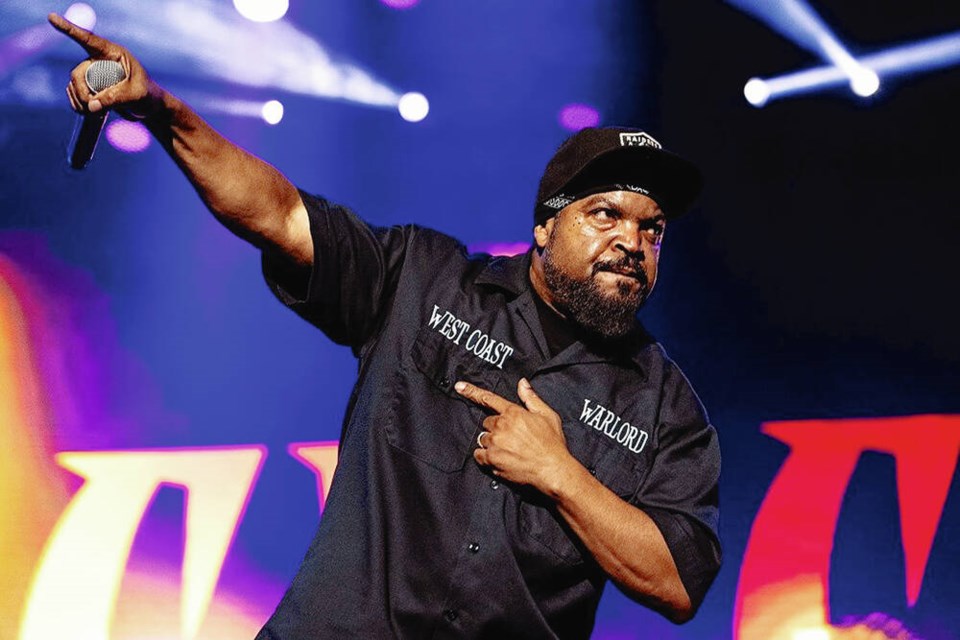ICE CUBE
With: Merkules and Peter Jackson
Where: Save-on-Foods Memorial Centre, 1925 Blanshard St.
When: Tuesday, April 23, 7 p.m.
Tickets: Sold out
Information: 250-220-7777 or selectyourtickets.com
The best-before dates for hip-hop pioneers were once measured in months, not years. Few who were there in the 1980s were expected to endure into the 1990s.
Ice Cube, who began rapping and writing in 1986, at the age of 16, is a rarity in that regard. The rapper-actor has moved the needle in several directions over the course of his 37-year career in sports and entertainment, with several chapters of his story currently being written.
“Music is still fun,” the rapper born O’Shea Jackson said during an exclusive interview with the Times Colonist. “When I was young doing it, I didn’t know I was going to make a living out of it.”
Cube, 54, is currently touring Canada to celebrate several decades of hip-hop hits, including It Was a Good Day, Check Yo Self, and Wicked. The second leg of his Straight Into Canada tour — a deft play on Straight Outta Compton, the groundbreaking 1988 debut from his group, N.W.A. — gets underway Tuesday with a sold-out stop at the Save-on-Foods Memorial Centre, where Cube performed with Snoop Dogg in 2007.
The Los Angeles native still performs in intimate venues, which create unique experiences, he said. Arena dates, however, are different beasts entirely. “When you go [to arenas], you’ve got to bring a different kind of energy to the show, and really project.”
His membership in the pioneering N.W.A., successful solo career, and recent collaboration with Snoop Dogg, E-40 and Too Short in the supergroup Mount Westmore have kept him at the forefront of a genre that recently celebrated its 50th anniversary.
He helped build the foundation, and enjoys the benefits that come with legendary status. Cube is a member of the Rock & Roll Hall of Fame (for his work with N.W.A.) and has a star on the Hollywood Walk of Fame, thanks to a flourishing movie career with more than 40 film appearances (including the Friday and Barbershop franchises) on his résumé.
His music endures, too. He hasn’t seen one of his singles make the charts since 2008, yet Cube still has 15 million monthly listeners on Spotify. By contrast, Killer Mike, who swept three rap categories at the 2024 Grammy Awards, nets only 2.8 million.
“I feel fortunate and blessed in so many ways to be able to move from one form of art to the other,” he said, adding that he’s pushed by the need to communicate in a creative way.
“I used to try and do everything at the same time. I’d work on a movie, and then I’d go right to the studio and work on an idea and then go back to the movie. But I realized the work suffered. You’re not as good as you need to be if you’re always acting, and the music isn’t as good either because you’re thinking about what you’ve got to shoot the next morning.
“I worry about executing every day, and knowing what is important. By prioritizing, you can do a lot of cool stuff without going crazy. I put things in their proper place now and focus. When I’m making a record, I’m not thinking about movies too much.”
Cube added more to his plate in 2017 by co-founding Big3, a three-on-three basketball league featuring 12 teams rostered with former NBA players. The league is a runaway success — a cost-friendly alternative to the glitzy NBA. For his efforts, Cube was entered into the the Naismith Basketball Hall of Fame in January, for his contributions to basketball.
His efforts are ongoing: The shrewd marketer, who parlayed his celebrity into Big3 partnerships with Adidas and CBS, made headlines worldwide three weeks ago by offering women’s college basketball phenom Caitlin Clark $5 million to play amongst men in the Big3 this season.
“I’m pleasantly surprised that [the league] is working but I’m not popping champagne and sh-t,” he said. “We’ve got work to do to keep it going, to keep fanning the flames and make sure it doesn’t fizzle out. We pissed the NBA off. And sports media has been slow to acknowledge our accomplishments. We’re the underdog.”
Cube knows a thing or two about fighting to be heard. Before hip-hop’s commercialization and presence among the zeitgeist, rappers had to battle for recognition — literally. The underdog spirit is a key part of most hip-hop success stories, Ice Cube included.
“It’s what I grew up doing. You’d hear about some dude who thought they could beat you, so you’d have them come up to the school and kick their ass. You’d get everybody around and would be busting raps, battling to see who is the best.”
Battle-mode intensity often spilled over to the streets, including when Cube levelled his former bandmates in N.W.A with the 1991 single, No Vaseline, widely acknowledged as the best “diss track” of all-time.
“Unfortunately, diss records sometimes lead to real violence. With No Vaseline, we had actual physical fights. That’s where it gets kind of hairy. You touch a nerve and that leads to somebody getting hurt, like in a Biggie-Tupac situation. A long as it doesn’t get physical, it’s fun. It’s part of the game. Hip-hop is a contact sport.”



